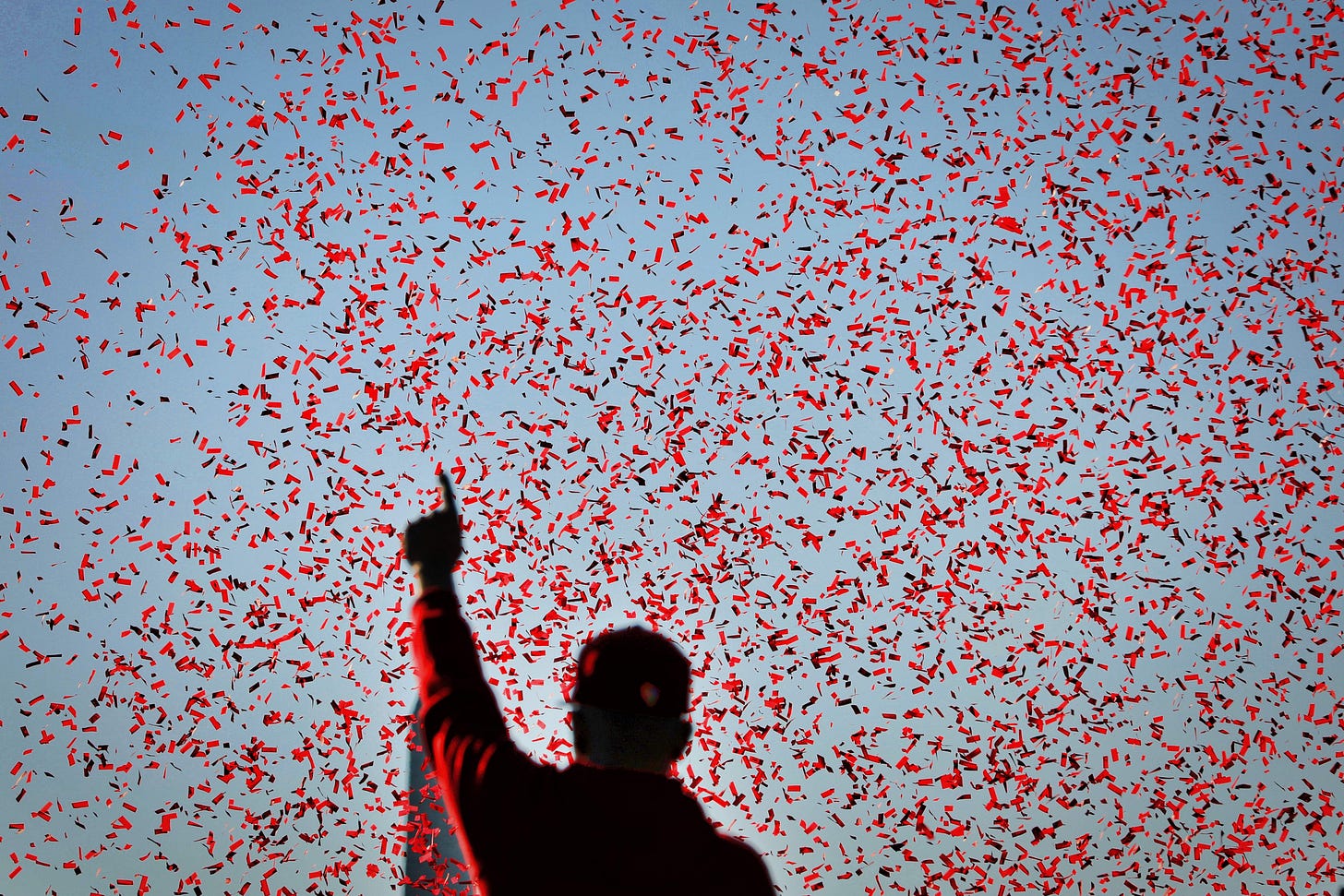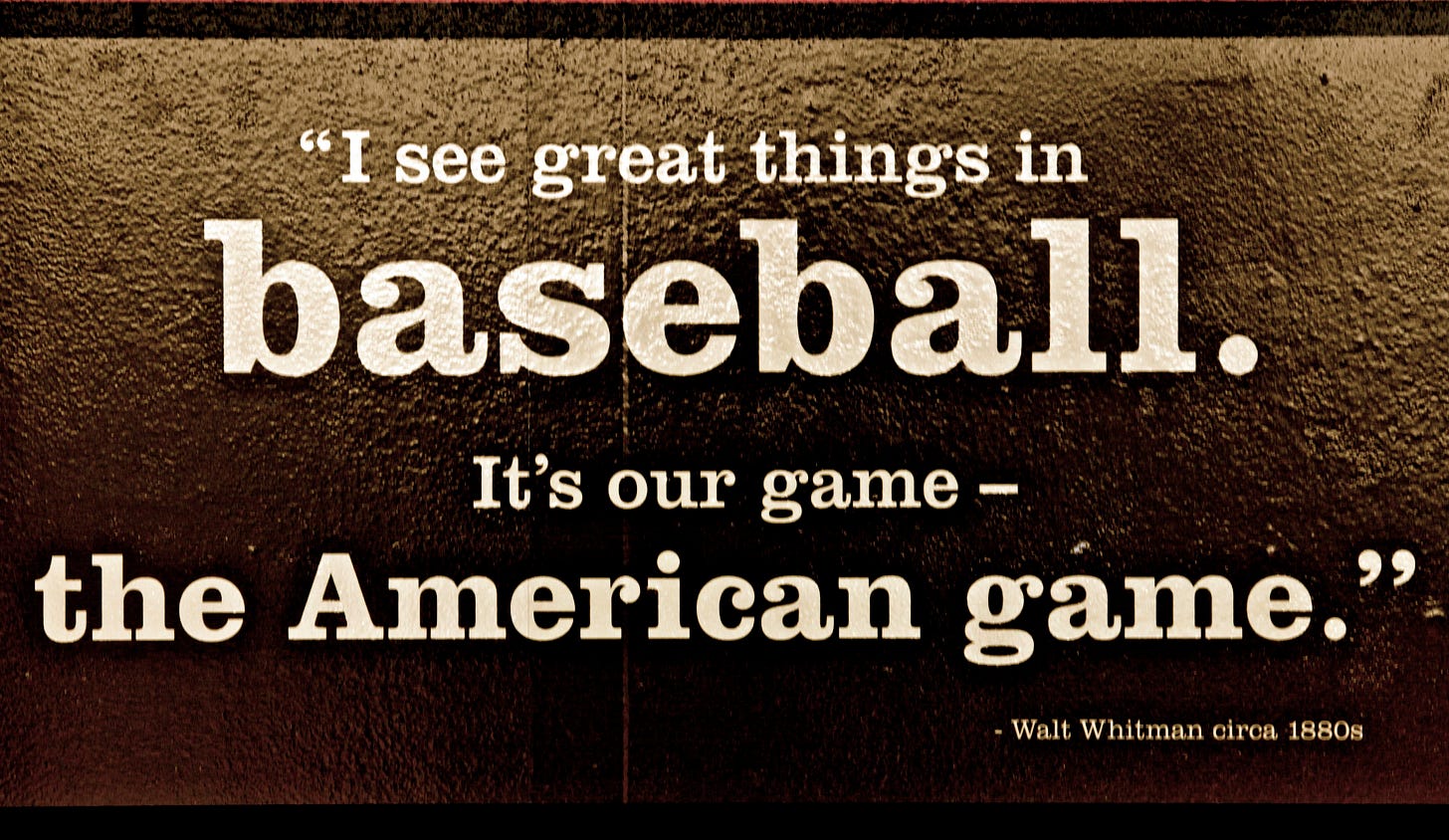For the Love of the Game
Watching your favorite baseball team can be a great romance, or a Greek tragedy
I’ve never had a large circle of male friends. The ones I’ve had, however, share a love for baseball.
Despite growing up in a football state, I’ve long subscribed to the romance of what Walt Whitman long ago dubbed “America’s game.” The leisurely pace of the games and the seasons. The countless books by authors who can — and do — write circles around me. The friendships and the bonds you develop through discussing and dissecting the games.
Baseball is a game of statistics, with enough acronyms to make any educator jealous. And those statistics are like nicotine; they hook you to the memories that seemingly last forever.
Here’s one such memory:
Brian, a college friend from the University of Houston, and I went to many Astros games in the 1980s and early 1990s, including the infamous National League Championship Series Game 6 when the team lost to the Mets in 16 innings. I was writing a story for the Texas City Sun, my hometown newspaper, and Brian managed to sneak into the press box because he worked on the sports desk at the Houston Post at the time.
Press boxes were much different in those days. Sportswriters smoked and drank during games; beer and hot dogs were free, as was the accompanying indigestion. Given that computers were in a nascent phase, and “portable” PCs were the size of small cars, most still scribbled their observations down in notebooks and called their stories in to the newsroom.
I worked nights, and I didn’t write sports, but my then-boss said I could go to the game as long as I didn’t drink. Brian was under no such restriction, having somehow secured the game pass on a night off. When the game went into extra innings, I called John — my boss — and asked if I could have a beer.
“Sure,” he said, scrambling behind the mounds of paperwork that were clogging his desk. “But just one.”
In the 14th, I called John. The Mets had just gone ahead and it looked like the Astros were going to lose. He said I could have another beer. Billy Hatcher homered in the bottom of the inning to tie it again, so I finished the beer and called John again. He said I could have a third.
Finally, in the 16th, the Mets scored three runs to take a 7-4 lead. The Astros came back with two in the bottom half of the inning, but it was not enough. Almost 5 hours after the game had started, the Astros — and Brian — were toast. I called John again and he was so disappointed in the result that he said I could stay.
We remained in the press box until they threw us out. It was the last time I had that level of access to my hometown team. The next year, at age 22, I left the Sun for the first time.
The Astros and the Nationals
Flash forward almost two decades. I’d been gone from the Houston area since 1993, having moved to North Carolina and then on to Northern Virginia in 2001. In 2005, as Ben tested out coach pitch baseball, I was wearing an Astros cap when I struck up a conversation with a fellow fan — Eric Kleppinger.
Little did I know then that Eric was an even bigger Astros fan than I was. His love for the team stemmed from a brief family stint in Texas and had never abated even though he spent most of his childhood in Vermont.
The Astros were great in 2005, advancing to their first World Series, a highlight during a tough year. Jill’s mom died and my father continued his downward slide. Brian, in many respects the other brother I never had, had died by suicide the previous fall. Hurricane Katrina devastated New Orleans and Houston was soon filled with evacuees who had no other place to go.
I went to Houston as Game 1 started, wanting to be part of something and to meet a mutual friend for a toast to Brian, who should have been there. We arranged to meet at a bar Brian and I frequented in college, but it had closed the previous week, so we made do at a hole in the wall. The Astros were swept in four games, a fitting end to a melancholy year.
I brought Eric a placard and a World Series cap. He promised to do the same for me when the Astros made it back to the series, not knowing then that it would take 12 years and Hurricane Harvey.
2005 also was the year the Nationals brought baseball back to Washington, presenting me with a dilemma. I still rooted for the Astros, and occasionally went to games when the teams — one lousy and one rapidly approaching bad — faced each other in D.C. Eric and I went to Houston a couple of times to see games and my family.
After Astros changed owners and moved to the American League in 2013, I found my allegiance slowly shifting to the Nationals. Even though they became the new masters of playoff heartbreak, Washington fielded a competitive team starting in 2012; Jill and I started going regularly to the games.
Houston lost a lot — more than 100 games for three years in a row — but gradually became more competitive. I slowly started to follow them again, rationalizing that I could root for one team each in both leagues. In 2017, the Astros and Nationals opened a shared spring training facility in Florida, and I had a chance to go with another friend — Tony Jones — to see the teams play each other.
The laid-back nature of spring training set the table for a season that was expected to be great for both teams. As a fan, I was nervous when the squads faced off in a meaningless spring training game, only to have the best possible result — a 9-9 tie after 10 innings.
Magical Times, Sad Endings
2017 was magical for the Astros, who overcame seemingly insurmountable odds to win their first World Series. The Nationals, then managed by Dusty Baker, won the division by double digits and collapsed again in the playoffs; Tony and I were at that game. Baker, a class act, was not brought back for the next season.
In 2019, the Nationals embarked on their own magical run despite losing Bryce Harper to the hated Phillies in free agency. After starting the season 19-31, the veteran club found its groove in mid-May. Baby sharks and conga lines formed and the team started winning. A rookie named Juan Soto took over for Harper and somehow the 19-year-old was better than his predecessor.
The Nationals ended the regular season on an eight-game winning streak that included a glorious five-game sweep of Harper’s Phillies. In the Wild Card game, they defeated the Brewers in what is the most thrilling sporting event Jill and I have ever witnessed live, then came back to defeat the Dodgers in the NLDS, advancing to the championship series for the first time.
They swept the Cardinals, coming out of the gate with seven runs in the bottom of the first in the final game. And then it was off to the World Series to face — who else? — the Astros.
For me, it was the ultimate win-win/lose-lose. And it was unbelievable, the first time in 1,420 best-of-seven postseason series — across MLB, the NBA, and the NHL — that the road team won every game.
I went to two of the three games in Washington — one with Eric and one with Jill — and my stomach churned the entire time. I had a feeling the Nationals would somehow win it, and somehow they did.
We know what happened after that. The Astros became mired in a cheating scandal from their 2017 World Series, eventually hiring Dusty Baker in 2020 to right the ship during a pandemic-shortened season. The Nationals stumbled throughout 2020 and the first half of 2021; last July they cleaned house and eventually lost 97 games.
This year, their record is worse. Today’s trade deadline saw their two best players — Soto and first baseman Josh Bell — go to the San Diego Padres for five prospects and a journeyman. In 2022 and likely beyond, 100 losses per year is looking like a moral victory.
The Church of Baseball
As a writer, I love to read, although I find myself leaning more toward non-fiction stories than the made-up ones these days. I don’t gobble up books the way I once did, even though I’m a sucker for a great long-form piece of journalism.
A couple of months ago, I learned that Ron Shelton had written The Church of Baseball, a memoir about the making of “Bull Durham,” the 1988 film that has been hailed as one of the best movies ever about baseball (and sports, for that matter).
I remember seeing an advance screening of “Bull Durham” in Houston, five years before I moved to North Carolina and several years before first visiting the city where my oldest son now lives. At the time, I thought Shelton’s screenplay was one of the best to come to life, and I still feel that way.
I bought the book on the first day it was out and binged it, laughing out loud frequently. It is a memoir about writing and shepherding the shaggy dog story of one minor league season that includes a romance with a love triangle, long-winded speeches, a ribald sense of humor, and an obvious love for the game.
My love for the game is not tarnished, but I do hate the business side. Losing Soto, a generational player, hurts. Watching teams you love tear themselves down to rebuild is painful.
I’ll leave it to the much better writers and analysts to debate the merits of the Soto trade, but I long ago realized there is no sense in hooking your allegiance to a single player. Loyalty may bring you great joy, but it also sets the table for a fair share of heartache.
And heartburn, depending on how many hot dogs you eat at a game.








Fun to re-live some cherished Astros memories from someone else's perspective! Thanks, Glenn!